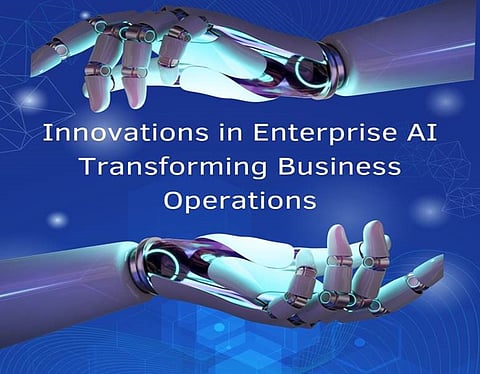

In this rapidly growing digital era, integrating Generative AI (GenAI) with enterprise systems redefines the future of business operations. The technological advancements in AI-powered platforms are revolutionizing decision-making, automation, and operational efficiency. Gopikrishna Yeturi, a technology expert, has extensively analyzed these innovations, shedding light on their transformative impact.
Integrating AI-driven automation within enterprise solutions has significantly improved efficiency, reducing manual tasks and optimizing workflows. Businesses adopting these technologies report faster data processing, improved accuracy, and streamlined operations. By leveraging AI-powered analytics, organizations gain deeper insights into their business processes, enabling more informed decision-making. Handling large volumes of data with precision and speed allows businesses to adapt quickly to changing market conditions.
Additionally, AI-powered platforms can analyze patterns in real-time, identifying potential bottlenecks and inefficiencies within workflows. This predictive capability helps organizations proactively address operational issues, improving overall business continuity and resilience.
GenAI enhances strategic decision-making by automating data analysis and generating valuable insights. The technology enables real-time processing of vast data sets, significantly reducing the decision cycle. AI-driven predictive models help businesses forecast trends, mitigate risks, and optimize resource allocation. Organizations can make more accurate and data-driven decisions with machine learning algorithms continuously refining their predictions.
Furthermore, AI-powered dashboards and reporting tools offer executives a clear and detailed view of key performance indicators (KPIs). These tools ensure decision-makers have access to the latest information, which is critical in today’s fast-paced business environment.
The automation capabilities of AI have transformed workforce productivity. By handling repetitive tasks, AI allows employees to focus on more strategic and creative aspects of their roles. This shift increases efficiency and enhances employee satisfaction by reducing mundane workloads.
Moreover, AI-driven automation tools facilitate seamless collaboration across departments by ensuring that information is readily available and workflows remain uninterrupted. With AI-powered chatbots and virtual assistants handling routine inquiries, human workers can dedicate more time to complex problem-solving and innovation.
Much an Automated Integration from an AI-Themed Module would revolutionize business connectivity through automated connection between systems and further security enhancement by AI-inherent detection of possible threats. Such solutions really build operational reliability through a real-time anomaly detection that prevents failures to IT teams. Thus, companies can avail themselves of high uptime and lessen disruption as seamlessly as possible through AI-enabled work and data access.
The financial benefits of using AI-powered enterprise solutions are very phenomenal. Most businesses claim that they have reduced operational costs through improved financial forecasting accuracy as well as returns from AI-powered platforms. Artificial intelligent automation also offers enhanced compliance monitoring that can reduce audit preparation time, costs, and increased effectiveness.
AI optimizes energy, waste elimination, and better resource allocation cost. This could also assist in identifying possible fraud and compliance violations, thus reducing financial and legal interventions for businesses.
AI chatbots improve customer support processes by quickly responding to queries, thus reducing waiting times for customers who need help and enhancing satisfaction. AI personalization makes services more individual-welcoming, thus enhancing engagement and retention. Also, recommender engines study user behavior to suggest relevant products, thus optimizing the customer journey and giving businesses that competitive edge through more solid client relationships.
The introduction of such AI based analytic tools into the systems has transformed data management and business intelligence. The firms using these tools benefit from improved accuracy of judgment and speed in insights determination. Now instantaneous analytics allow faster and data-oriented decisions, which the organizations use for remaining competitive in an ever-dynamic market.
AI analytics also recognize the behavior patterns of consumers, furnishing businesses with actionable insights on marketing and sales strategies. AI provides learning from new data so companies can update their strategies with optimum results through their analytics.
The future of artificial intelligence within enterprise solutions is very promising. Companies will increase their investments in AI-driven innovations. New functions of AI, such as autonomous decision-making systems as well as real-time adaptive analytics, will continue to enhance business performance. These along with other possible improvements of AI would potentially shape the future of digital transformation.
AI will enable intelligent supply chain solutions focused on optimizing the logistics and inventory management. Companies will rely extensively on AI-powered solutions in the future for being more agile and market-responsive.
Just to summarize, Gopikrishna Yeturi says that the advancement of AI is now making enterprise systems much more efficient, effective, and innovative, as well as providing a competitive edge. Organizations willing to adopt technologies such as these will place themselves very strategically for consistent growth and success in the digital age.
